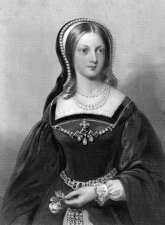 Lady Jane Grey
Lady Jane Grey
English Martyr
1537 – 1554 A.D.
Lady Jane Grey, an English martyr, celebrated for her talents, her virtues, and her misfortunes. She was the daughter of Henry Grey, Marquis of Dorset, and was related to the royal family. From her early years, she exhibited a quickness and comprehension of mind, that have rendered her one of the prodigies of her sex and age. Roger Ascham has recorded, that, on paying her a visit in her fourteenth year, he found her reading the Phaedo of Plato. She was able at this time to write Greek with facility, and is said also to have acquired not only the French and Italian languages, but the Hebrew, Chaldee, and Arabic. With all these endowments of the understanding, she possessed the modesty and gentleness proper to her sex.
But the alliance of her family, and their ambition, were too powerful to suffer her to live in seclusion. No sooner was the declining health of Edward VI perceived by his courtiers, than Dudley, Duke of Northhumberland, prevailed upon the unsuspecting monarch to settle the crown upon his relation, Lady Jane, and to pass over his sisters, Mary and Elizabeth. When this was effected, the artful favorite married his son, Guildford Dudley, to the future queen, and thus paved the way to the elevation of his own family to the throne. But while others rejoiced in these plans of approaching greatness, Jane alone seemed unconcerned, and when, at last, on Edward’s death, she was hailed as queen by her ambitious father-in-law, Northumberland, she refused the proffered dignity, till the authority of her father, and the entreaties of a husband she tenderly loved, conveyed to the tower, preparatory to her coronation, and was proclaimed queen in the city, and honored with all the marks of royalty.
But this elevation did not last long; at the end of nine days, during which Mary’s party had come into power, Jane’s father announced to her the necessity of returning to a private station. She expressed herself much better pleased with the act of relinquishing, than she had been with that of assuming the crown. Soon after, Northumberland suffered the just punishment of his treason, while Lady Jane and her husband were committed to custody, but hopes were entertained that justice would be satisfied without the sacrifice of a victim so involuntarily criminal. This might have taken place, had it not been for an ill-advised insurrection, which was joined by Jane’s father and his brothers. After its suppression, it was resolved in Mary’s council, that, for the future security of the crown, Lady Jane and her husband should be put to death. She received the notification of this purpose with her accustomed firmness and tranquility, and prepared herself for the final hour.
On the fatal morning, her husband, who was confined separately, having obtained permission from the officers, sent a tender request to take a last farewell of her. This, however, through the apprehension that their resolution might be shaken by such a meeting, she thought it best to decline; and she contented herself with giving him a parting token out of her window as he was led to execution. She saw his remains brought back, and her turn soon followed. With a composed countenance she proceeded to the scaffold, where she made an address to the bystanders, acknowledging her fault in not rejecting with sufficient steadiness the crown which was forced upon her, and expressing her willingness to expatiate her crime by death. She assisted her women in adjusting her dress, took leave of the attendants, and saying, “Lord, into thy hands I commend my spirit,” she laid her head upon the block, and received the fatal stroke, February 12, 1554, in the seventeenth year of her age.
~*~
Reference: Famous Women; An Outline of Feminine Achievement Through the Ages With Life Stories of Five Hundred Noted Women By Joseph Adelman. Copyright, 1926 by Ellis M. Lonow Company.

